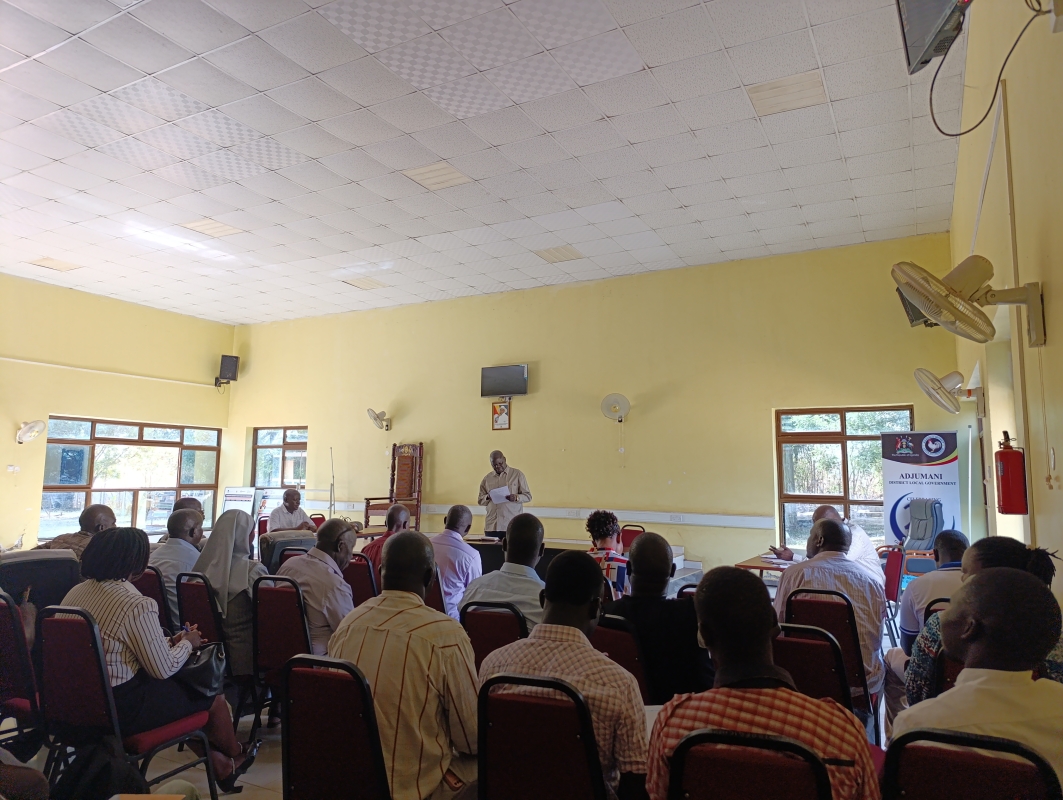Attention
ADJUMANI HEALTH FACILITY INCHARGES MEET TO RE-STRATEGIZE AMIDST HALTED USAID FUNDING.

By Bazio Doreen.
Adjumani District leadership has convened a meeting with all health facility in charges in the district to strategize how to maintain service delivery amidst the halting of funding from the United States Agency for International Development (USAID). This follows an executive order by H.E. Donald Trump, President of the United States, directing that all funding through USAID should be halted.
Hon. Anyama Ben, the District Chairperson, says the need to re strategize is critical to evade collapse of the health system set in place, avoidable deaths, and bridging the funding gap. While providing a temporary solution, Chairman Anyama offered fuel for six months for the transportation of samples to Kampala.
Impact in Adjumani.
According to Mane Dolorence, the HIV focal person, immediate re-alignment of programing is key because the withdrawal of the funding support will affect: 28 staff at Adjumani Hospital, Mungula HC IV, Pakele HCIII, and Dzaipi HCIII; operation of the ART Clinic, male circumcision, and outreaches; delivery of ARVs, condoms, and lubricants in isolated critical areas; HIV prevalence among young people (2 new infections per day); data compilation on HIV/AIDS, Leprosy, and Tuberculosis (TB); monitoring of viral load for HIV patients; delays in TB diagnosis and transportation of 83 TB drug-resistant drugs to Arua for monthly review.
Recommendations.
Dr. Drametu Dominic, the District Health Officer, says that the Ministry of Health has already met with all his counterparts countrywide, and it was agreed that the withdrawn services should be integrated into routine government programming and encourage the affected staff to mentor government workers on the skills required for continuity of service delivery during the 3 months the United States will be reviewing their support to developing countries under the USAID.
The meeting also suggested other interventions like: fast-track the recommendation/resolution passed by the Uganda AIDs Commission directing local governments to allocate 0.5% of their total budgets to finance interventions towards HIV/AIDS prevention; lobby support from other donors; allocate funds to maintain one hub rider (transporting samples); encourage patients of the affected interventions to contribute towards continuity of the services; encourage health facilities to commit/contribute resources in a pool (District Health Office) for continuity of critical services; and encourage health facilities to redistribute resources according to emerging priorities.
General challenge.
In the health sector, USAID funding has been instrumental in combating infectious diseases, improving maternal and child health, and strengthening health systems. Programs like the President’s Emergency Plan for AIDS Relief (PEPFAR) provide antiretroviral therapy (ART) to thousands of HIV-positive individuals. The withdrawal of funding will lead to interruptions in treatment, putting patients at risk of drug resistance and increased mortality. There are currently more than 1,416,800 people on ARV treatment across 2,051 health facilities. The suspension of services will mean immediate disruptions in care for thousands of individuals dependent on consistent medication.
Among the most affected are pregnant women living with HIV, who rely on PEPFAR for treatment to protect their health and prevent mother-to-child transmission. In Uganda alone, 41 newborns are estimated to contract HIV every day during the stoppage. Over a 90-day period, this could lead to more than 3,690 babies being born with HIV, many of whom will also go undiagnosed due to the suspension of infant HIV testing services. These infants face a significantly higher risk of mortality if they do not receive immediate treatment.
Beyond direct beneficiaries, Uganda’s healthcare workforce is also severely impacted. The country has 20,809 PEPFAR-supported healthcare providers, including 923 doctors, 1,622 nurses and midwives, 756 laboratory staff, and 12,551 community health workers. With stop-work orders in effect, many facilities will be left understaffed, making it difficult to provide even basic medical care. This will not only affect HIV services but also disrupt the broader healthcare system, straining already limited resources
USAID has supported immunization, malaria, and TB campaigns. Rural clinics will likely face shortages of vaccines, essential medicines, and health care staffing, resulting in a resurgence of preventable diseases. Maternal and child health services also face disruptions, potentially increasing maternal mortality rates.
END.
